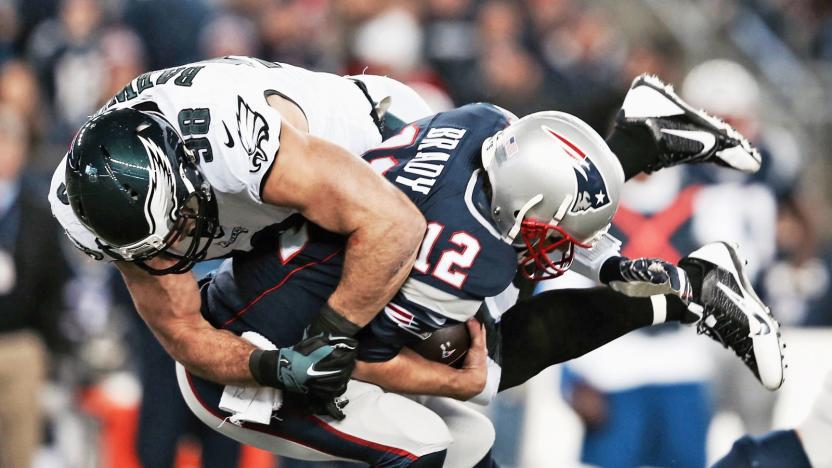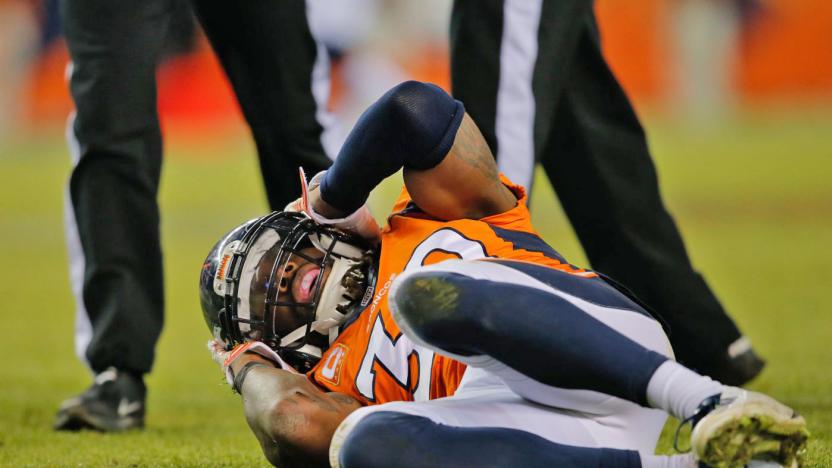concussions
Latest

Study backs blood test that gauges seriousness of concussions
Remember how the FDA approved a blood test that could determine the severity of a concussion? It's now clear just why the FDA gave its approval. The Lancet Neurology has published the study at the heart of the decision, giving you a chance to verify the claims for yourself (if you're willing to pay, at least). As before, Banyan Biomarkers' test checks for the presence of two brain proteins (GFAP and UCH-L1) whose levels rise when there are signs of internal trauma. The FDA's claims check out -- out of 1,959 eligible test subjects, just three had CT scans turn up results when the blood tests were negative.

Technology can’t save football players' brains
Tregg Duerson was 25 years old when his father committed suicide in 2011. A former defensive back for the Chicago Bears, New York Giants and Phoenix Cardinals, David "Dave" Duerson made a career out of being one of the most feared tacklers during his 11-year stint in the National Football League. His skill set helped him win two Super Bowl championship rings, one with the Bears in 1985 and another with the Giants in 1990, cementing his legacy as one of the NFL's all-time greats. Along the way, he was also selected to the Pro Bowl, a postseason game that rewards the league's best players, four consecutive times from 1985 to 1988. Duerson had the NFL career most players can only dream of, but it ultimately cost him his life.

The Eye-Sync system can diagnose concussions in one minute
Concussions are no joke -- just ask Cam Newton -- but a new diagnostic system developed in conjunction with Stanford University could revolutionize the way these head injuries are determined. The Eye-Sync, from the SyncThink company, uses a modified VR headset and custom software running on a consumer tablet to diagnose concussions in just one minute.

Harvard researchers built a health app for former NFL players
Since 2014, Harvard University has been running the Football Players Health Study, a program that examines the well-being of former NFL athletes as they leave the game behind. Now, as part of its ongoing research, the Ivy League college developed an app called TeamStudy, which uses simple physical activities, surveys and sensor data from an iPhone to learn more about the state of a player's health. The collected data comes together in one place thanks to Apple's ResearchKit, and Harvard researches say ex-NFL players helped design the iOS application, as they wanted it to focus on important issues including balance, memory, mobility and pain, to mention a few.

Football concussions could be reduced, if Riddell's InSite system goes into play
"This is not a diagnostic tool." That's what Riddell, the country's largest manufacturer of football helmets, kept emphasizing during a presentation of its newly developed InSite head-impact monitoring system. The fact it would throw this disclaimer out there isn't surprising, really. After all, the topic involving concussions in the NFL is one that's been massively debated by many different entities, inside and outside of the sport, over the past few years. Most recently, PBS debuted a documentary titled League of Denial: The NFL's Concussion Crisis, in which it delved deep into the "hidden story" between brain injuries and the National Football League. But the problem itself goes considerably deeper than that: Here in the United States, the game is ubiquitously played across youth, middle school, high school, college and, of course, professional levels. And while both the NFL and NCAA have made rule changes in order to "protect" players by trying to minimize the number of hits above the neck, the same can't be said for lower-level leagues -- not to mention, there's only so much that can be done in a game which requires body-to-body contact at full speed during 15-minute quarters.

Reebok and mc10 team up to build CheckLight, a head impact indicator (hands-on)
Concussions have always been a concern for those who play contact sports. However, there's been a renewed focus in recent years by the sports community -- the NFL in particular -- to learn more about concussions in the interests of promoting player safety. Pro leagues aren't the only folks tackling the problem, though. Verizon, Intel and Ridell are all building systems to help identify concussed players. Reebok and mc10 have collaborated to create CheckLight, a head impact indicator meant to make it easy to see when an athlete has taken a dangerous blow to the head. The CheckLight is composed of two parts: a sensor device built by mc10 and skull-cap made by Reebok. The sensor itself is a strip of plastic filled with flexible sensors connected to a small microcontroller module with three indicator LEDs and a micro-USB port. One LED serves as a battery level indicator, one flashes yellow after moderate impacts and a third flashes red for severe blows. mc10 wasn't willing to share the exact hardware inside, but we know that it's got a rechargeable battery and has rotational acceleration, multi-directional acceleration, impact location and impact duration sensors. Data from those sensors is then run through the company's proprietary algorithm to determine when to fire the LEDs. We got to chat with Isaiah Kacyvenski -- mc10's Director of Licensing and Business development and ex-NFL player -- about the CheckLight and the role it has to play in keeping athletes safe, so join us after the break for more.

Two universities adopt Wii Fit to monitor football concussions
As it turns out, there are quite a few uses for a $100 off-the-shelf computerized scale, above and beyond getting fit -- Nintendo's Wii Balance Board is now providing a mechanism by which college football teams at Ohio State University and the University of Maryland can cheaply determine whether players are suffering from concussions. Taking the place of force plate machines that can cost tens of thousands of dollars, the white plastic boards measure students' balance (using yoga poses) and coordination (in Table Tilt) before a game, to provide a frame of reference against which trainers can measure whether athletes are fit to keep playing. Though some scholars found Wii Fit didn't stack up favorably against the expensive force plates, the universities trialing the system called it "pretty decent," so the question is whether Nintendo's peripheral offers a reasonable enough benchmark for the price. We suppose the American Heart Association liked it well enough.



